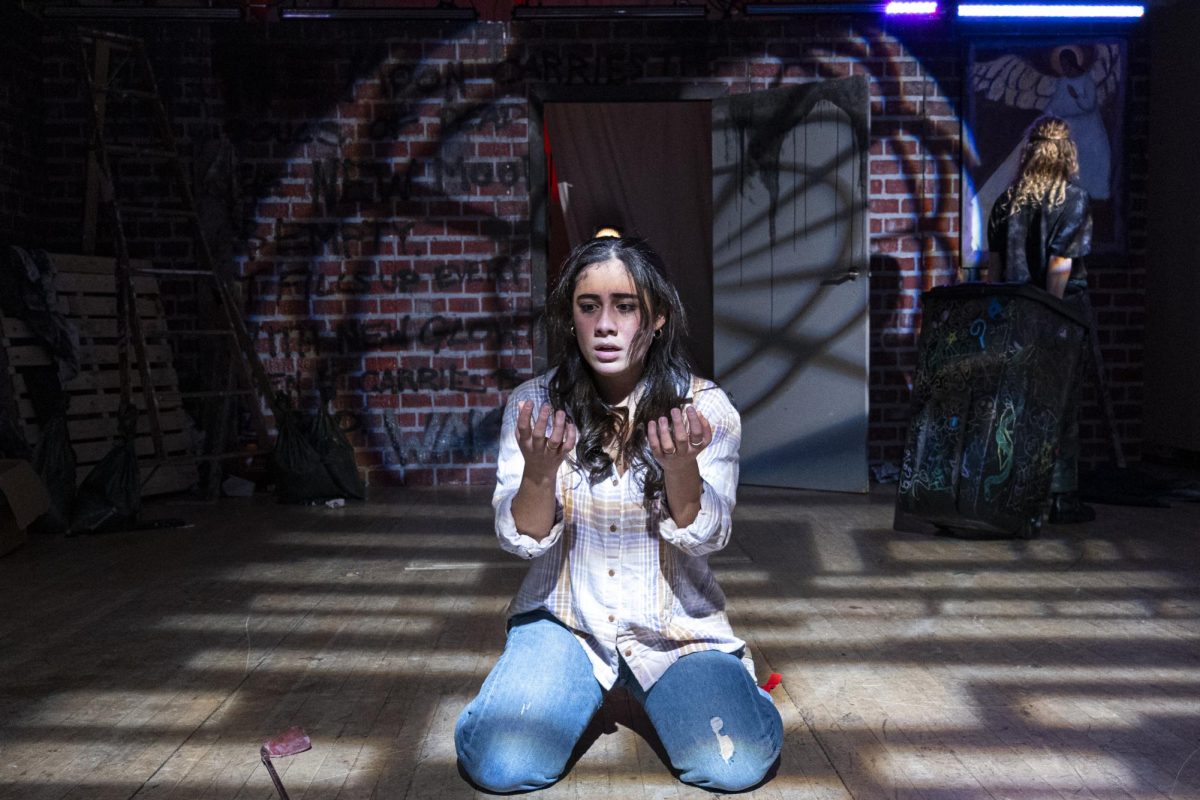Past the hazy red glow at the entrance of Fordham Lincoln Center’s White Box Theatre, there is a run-down corner of the Bronx. The brick walls are scrawled with graffiti, the space illuminated by blinding LED lights, and the stage cluttered with trash bags and traffic cones. But to Marisol Perez, the titular character, it is home.
Based on an interpretation of the famous “Marisol,” originally written in 1992 by José Rivera. The show was reimagined and directed by Fabiola Arias, Fordham College at Lincoln Center (FCLC) ’24, as her thesis production. “Marisol” depicts a surrealistic future emerged from the ruins of a neglected society. It is an ambitious exploration of religion’s unsteady role in modern society, and a reminder of the urgent need for social change. Arias described the play as “a Rubik’s cube that can never be solved,” but her directing breathes life and passion into every moment.
The titular character, Marisol (Mariana Miranda, FCLC ’27), is a young Puerto Rican woman, who is a New York native and devout Catholic, working as a copywriter for a publishing company. The city she knows intimately is becoming a danger zone and especially as a woman living alone, Marisol risks her life simply by stepping outdoors. On the train to work one day, Marisol is viciously attacked by an unhoused man with a golf club while her trusted guardian angel (Nina Polaris, FCLC ’25) observes from above, interfering just in time for Marisol to make her escape.
The attack is the final straw for Marisol. She quickly plans to leave her hometown, in the Bronx, and move into her friend June’s (Evan Cain, FCLC ’26) Brooklyn apartment, despite June’s often violent arguments with her eccentric brother Lenny (Aiden Castillo, FCLC ’26). The entire scene is suddenly thrown into question, however, when Marisol sees her own name in headlines, pronounced dead. It’s never quite clear what truly happened on that subway, but the feeling of Marisol’s despair is visceral as she faces her own mortality.
This is only the beginning of the end. Countless absurdities in an apocalyptic New York City unravel: from the moon disappearing, to food turning into salt, to credit card debtors being tortured by the government. These events are the result of a celestial war, as the angels fight to replace their ancient and dying God.
Polaris’ performance as the guardian angel is ethereal and commanding, drawing the audience into the simultaneous passion and despair of the heavenly conflict. Marisol has always depended on God and her guardian angel for protection, and she is forced to navigate a world where even the angels are in a state of chaos and disorder.
The characters that Marisol meets on her apocalyptic journey challenge her bootstrap mentality and lead her to come to terms with the poverty that many New Yorkers face. She befriends an unhoused man, visits the graves of dead children and encounters a woman (Kat Fosmoen, FCLC ’26) who, despite her wealthy appearance, is heavily burdened by credit card debt. The play challenges the long-held “American Dream” ideal that hard work always leads to social mobility, and Marisol learns not to judge a book by its cover.
“It felt impossible. I read it, and I loved it and it scared me, and then I read it again and I loved it even more and it scared me even more.”Fabiola Arias, FCLC ’24
The confusing disarray of the nightmarish, non-linear timeline can be difficult to take in, but it is crucial to exploring the role of a Latina trying to claim a sense of agency in the midst of a socioeconomic environment that constantly weighs marginalized groups down. Marisol had always found stability in the systems she existed in, even when they oppressed her, and the nonsensical world around her compelled her to seek a higher sense of identity.
Even after Marisol’s tragic fate, the play ends with more left to the story as the war with God continues; the audience is left with hope that the desolate city will see a brighter future.
Regarding her inspiration for the show, Arias said she chose Rivera’s play “because it felt impossible. I read it, and I loved it and it scared me, and then I read it again and I loved it even more and it scared me even more, and then again and again and again until fear and love were the only things that were left inside me.”
Arias’ words encapsulate the duality of a show that is meant to be met with both confusion and awe. “Marisol” is foreboding but not nihilistic; underneath its apocalyptic fantasy is an unmistakably human spirit that urges empathy and connection.
The play lingers on your mind long after the initial experience; it is at its most impactful not in the intensity of the moment but in the quiet contemplation it leaves you with. The plot charges forward at a breakneck pace, and the heavy themes are not for the faint of heart, but the cast of talented actors handle it with both power and grace.
Arias shared that her goal as a director is to make art “that tells stories that are never told, that centers culture and diversity, that makes people feel less alone, and that opens a space for people to feel seen and understood,” and “Marisol” undoubtedly achieved that.
The show had a sold-out, three-day run at the White Box Theatre from March 4-6.

